The following contains spoilers for Moonhaven S1E1, “The Pilot” (created by Peter Ocko)
Like all really good sci-fi, what makes Moonhaven immediately compelling is the way it immerses you in the world it’s created. I don’t mean the show’s premise, which one could argue is a bit silly. The execution of the premise—the production, sound design, acting, direction, etc.—make it not silly very quickly. One believes that this colony has been set up on the Moon in order to save the future of humanity, and buys into the culture of the Glade as plausible with all of its oddness, due to how Moonhaven has been made (by everyone involved in making it).
It also really tickles me that the pilot of Moonhaven is titled “The Pilot” and centers around a protagonist who is a pilot: Bella Sway (Emma McDonald). There is a quirky and self-aware humor that runs through S1E1, which should be no surprise given showrunner Peter Ocko’s resume.
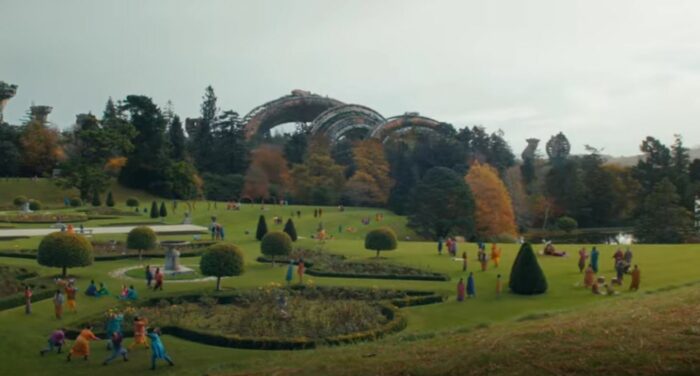
The opening scene of “The Pilot” may be a bit of a trope, but it’s not yet a worn out one. At least for me, a young woman running through the woods at night for reasons unknown remains gripping. And indeed, the mystery of why Strego (Adam Isla O’Brien) killed Chill (Nina Barker-Francis) seems to be far more at the heart of the narrative of Moonhaven than anything else in S1E1, as we’re still not clear by the end of the episode on how it relates to the broader stakes of colonists returning to Earth, but reasonably sure that it must in some fashion. One is tempted to return to the opening scene after the close of “The Pilot” in search of clues, and I expect that temptation will continue until we finally understand what the pair are talking about.
The murder also puts a bit of a taint on the purported lunar utopia, but in the thought that “darkness finds a way” we see a recognition of the dark impulses of humanity playing a role in shaping the betterment of civilization, so there is a lot of nuance to be explored in various ways as the series moves forward.
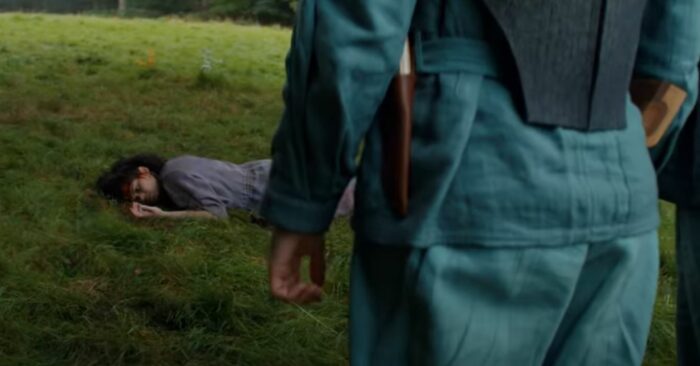
Moonhaven pretty directly pulls from dystopian fiction that has preceded it, but this gets a nice wrinkle in Paul (Dominic Monaghan) noting that they’ve read these works as he contends that IO (the AI guiding the colonists) seeks not to control humanity but to help it. Of course there is a ton of sci-fi playing with how the best intentions (in particular of an artificial intelligence) can go horribly wrong, but what I find intriguing in the setup of Moonhaven so far is how it might be going in the other direction. What if all of this is right, in terms of ameliorating human suffering while at the same time providing people with happy and fulfilling lives?
Paul references three authors specifically: Orwell, Kazuo, and Mwangi. I can’t say I am well-versed personally in either of the latter two, though I presume he means Kazuo Ishiguro and Meja Mwangi. It’s possible that I’m wrong about that and missing something, but either way I’m afraid I don’t have a lot of insight. If you do, please let me know in the comments.
Orwell I have read extensively, and Paul’s remark cuts to something I have found myself thinking about a lot in recent years. 1984 presents a world where citizens are under constant surveillance and punished for thoughtcrime. We’re ultimately told that the Party wants power for the sake of power, and so on. With all of these things, it is worth pondering whether our objection should be to the ends at play or if we ought to object to the means for formal reasons, no matter how good the goals are. That is, would the notion of thoughtcrime remain objectionable if it wasn’t the truth that was illegal but pernicious bigotry? I don’t have the answer with any certainty, but Paul is clearly implying that surveillance by implant since birth is fine and dandy because IO can be trusted.
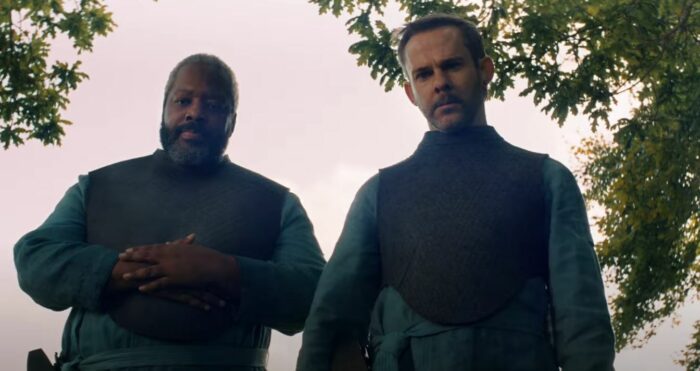
My hope is that as Moonhaven progresses the problem is not so much that IO cannot, as it turns out, be trusted, since that might be a compelling enough story but it’s also one that’s been done any number of times before. Instead, my hope is that Moonhaven explores questions of value in light of IO’s plans actually being well-grounded and good plans for human happiness, and the series seems primed to do precisely this.
On this front, the touchstone work of literature is most directly not 1984 but Aldous Huxley’s Brave New World. Paul does not mention Huxley, but it’s clear that the creators of Moonhaven know that they’re playing with his ideas, from the parallel between the Bright and Soma to the idea that children are not raised by their biological parents. There is also something of the idea of an encouraged polyamory. But all of these things seem to be somewhat mitigated in the Glade, in comparison to how they’re taken to an extreme in Huxley’s novel. We’re led to contemplate whether there is truth in the idea that strong personal attachments cause more suffering than they’re worth, and if there is anything wrong with dulling the pangs of grief that can make it nearly impossible to live.
Of course, we should be thinking about those questions already when we read Brave New World, but it seems possible that IO has effectively undercut the inherent critique of that narrative—that while happiness might be maximized this comes at the expense of meaningfulness. I guess I don’t know if the Mooners can really appreciate Shakespeare, but they don’t seem to be blissed out and braindead by any means. They are cultured, and the darkness of the human soul has not been eradicated, as though from a recognition that it can’t be. It can only be grappled with, however successfully.
Thus, I’m put rather in mind of Ursula Le Guin’s story about the Omelas, wherein she paints a picture of a society that has achieved happiness in a thick sense that includes meaningfulness. The rub is that this hangs on the suffering of a child, and everyone knows this is the cost. There are multiple ways to interpret this, including a thought about affluence being built on the backs of an oppressed minority, but I’ve always thought that the point was more endemic to the knowledge of the suffering of the child—that perhaps we have to know suffering to have rich and meaningful lives, and while it may be the suffering of another, some nugget of this is taken in by each of the Omelas through their complicity. Though there are some, Le Guin suggests, who walk away.
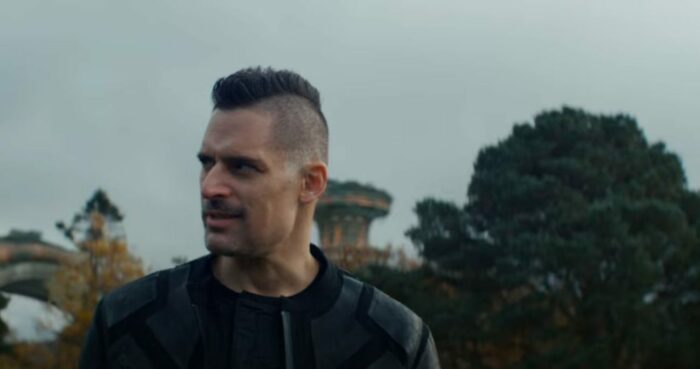
If there are parallels to the story of Moonhaven, I wonder if Strego and Tomm (Joe Manganiello) might ultimately be seen as ones who walk away, but if there is anything analogous to the suffering child upon whom the happiness of the Omelas rests, it hasn’t been made apparent by the end of “The Pilot.”
I suppose some thought could be there in how IO wants to work with the inherent darkness within humanity, or we might think about the strange girl that Bella follows outside of the colony, but mostly I’m impressed so far with the way that Moonhaven is taking up all of these questions that have reference points in literature but spinning them in its own way. I don’t think this story is going to reduce to some other story we’ve already read.
So again, what if IO is right? We move in the direction of contemplating the nature of the Good.
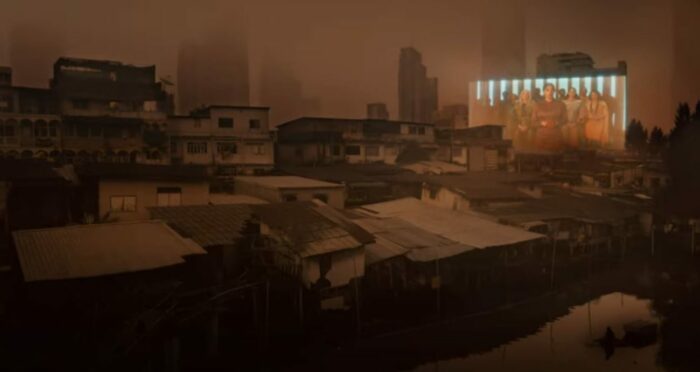
We don’t learn a whole lot about the Earth in “The Pilot,” but it would seem that the world of Moonhaven is basically our own, just pushed close to 200 years into the future. And nothing has been done about the environment, because of course it hasn’t, or any of humanity’s other problems.
Just imagine things continuing to get worse, as technology continues to advance, and after a couple of generations someone launches this crazy plan to start humanity over on the Moon, with the guidance of this AI called IO. It’s more plausible than you think if you just read the tagline.
What will happen, though, when these Mooners try to come back to Earth? No one seems to think it will be easy, but the deeper question is whether the kind of society we see in the Glade is a good one.
Huxley and Le Guin’s stories serve as critiques of Utilitarianism, and it’s an easy target, particularly if taken a way that lacks nuance. But if you read utilitarians like John Stuart Mill or Henry Sidgwick, there is a strong recognition that happiness involves more (and more important things) than physical pleasure. Further, while it may be a powerful objection to the theory to worry about how it might justify exploitation, the idea in its serious form has never been so simple as the suggestion that we should do what’s best for the majority.
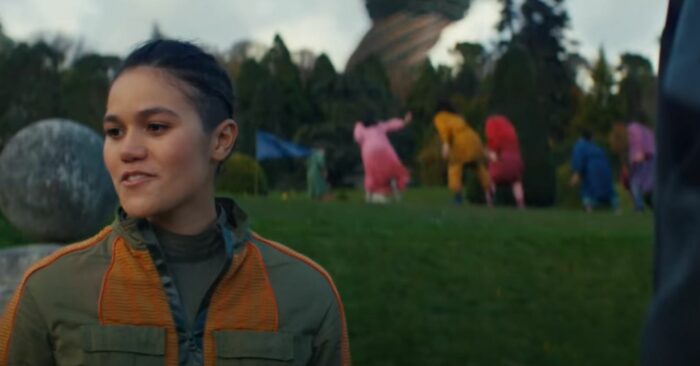
Happiness is good and suffering is bad. Don’t you agree? Pleasure is good because it is pleasing and pain is bad because it is painful. There’s a concreteness to this thought, which then gets extended to the claim that this is all that is important morally speaking: maximizing happiness and minimizing suffering. But everyone counts equally, so causing a minority to suffer would only be justified if it is the best possible plan.
It’s easy to craft a story that puts the plan in the hands of an artificial intelligence that doesn’t recognize certain human values, like that placed on liberty, for example. But at least from what we’ve seen so far, IO seems to be grappling with those values. The society of the Glade really seems pretty good, if perhaps a bit cheesy.
The question is perhaps whether there is inherent value in misery. As Bella quips, after putting on “Ne Me Quitte Pas,” she likes being miserable, but apparently that’s going out of style. The song is a fitting entry to the question, as its melancholic beauty stems from the pain of lost love, or from the space on the brink of losing it. Here is an English translation of the lyrics, from Jamie J. Brunson:
Please don’t leave me.
We can forget
Everything can be forgotten
Look, it’s gone already
Forget the times
And the misunderstandings
The lost time
The blows
The hours that robbed our hearts of joy
Don’t leave me (4 times)I offer you pearls of rain
From places in me where there is no rain
I will raise the earth until the day I die
To cover your body in light and gold
I’ll make a place for us
Where love is king
Love is law
And you are queen.
Please don’t leave me. (4 times)Don’t leave me
I beg you
Ah! Do you understand my words?
Are they senseless, the words I speak
Of our history?
It is king
It does not have to perish
Just don’t leave me.How often has the fire of an old volcano
Erupting, burn the land
Then in that place more wheat grows than at harvest.Each day ends when evening comes
The brilliant night sky is red and black
Can the night be brilliant without both?
Please don’t leave me. (4 times)I have implored you
With my words
If you leave me, I will unbecome myself
And become the shadow of your shadow
So that I can watch you dance and smile
So that I can hear you sing and laugh
As the shadow of your shadow.Please don’t leave me.
Please don’t leave me.
Please don’t leave me.
Please don’t leave me.
It’s a haunting song, which Indira dismisses as Romantic because it is, but maybe there is a value in such suffering that is beyond rational explanation. If you’ve ever wallowed in your own despair after a breakup, perhaps listening to “Ne Me Quitte Pas” (I like the Nina Simone version), could you truly say you’d prefer a life without this experience?
Before she takes the Bright, Chill’s sister Asus (Lilit Lesser) laments that the pain of grief (which it is supposed to dull) is where the love is.
Is it perhaps a mistake to seek a life free from suffering, and to build a society around this premise?
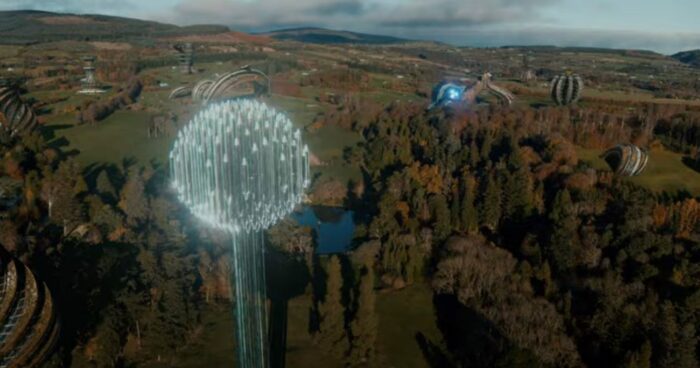
Indira (Amara Karan) informs Maite (Ayelet Zurer) that her council is to be dissolved, with the new one to install her replacement. It’s a purely preventative measure, based on IO’s understanding of the perils of power, but Maite’s response and invocation of God would suggest she’s not about to go quietly. That’s completely understandable, but given the context I think we need more information before we decide whose side we’re on. Perhaps Maite has an egoistic attachment to her position of power and the God talk is an indication of this veering into mania, or maybe she’s completely in the right, and getting at a value that transcends mundane reason. We don’t know yet.
Neither do we know what Strego accomplished on the ship before the fight that ends “The Pilot.” It would seem that he and Tomm were in cohoots, except it also seems that Tomm kills him. Why? And why did Strego kill Chill? And does Bella kill Tomm? Is Indira OK?
Perhaps this is the time to note that though AMC+ is releasing the first two episodes of Moonhaven at once, I’m writing this having only seen the first of them. I also quickly turned off the promo that started playing with scenes from the season as a whole.
I tend to think that both of these things are something of a mistake when it comes to this show. “The Pilot” isn’t just aptly named because it centers on a pilot, but is a proper pilot episode of television, in the old style. It introduces us to the world of Moonhaven, intrigues us with a mystery we don’t even fully understand the parameters of yet, and upends things as it closes to make us eager to continue watching the show.
I wish they’d released this episode and made us wait a week. But as it stands, on to Episode 2!

